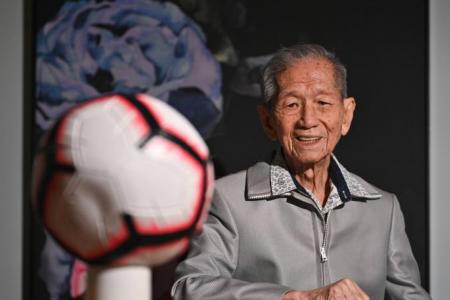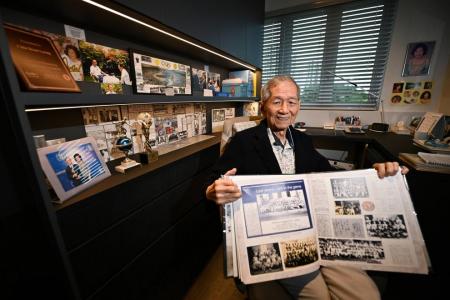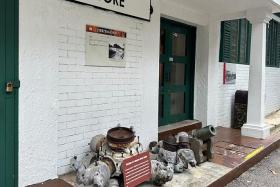Ex-footballer recounts Japanese Occupation years; journey from execution screening to 1948 Olympics
In his footballing heyday, Mr Chia Boon Leong was known as "twinkletoes" for the way he danced around opponents with ease.
That ability to skirt danger was honed as a teenager growing up in war-torn Singapore, where he continued to play football, often in Jalan Besar Stadium and at a field behind the Singapore General Hospital, near his family home in Tiong Bahru.
He was a founding member of Pasir Panjang Rovers - having grown up in the area - a cosmopolitan team that played only friendly matches before the war as multi-ethnic teams were not allowed in the Singapore Amateur Football Association's leagues.
In about six short years, he went from being screened as part of efforts to weed out anti-Japanese elements - which meant execution for some - to being selected as one of two Singaporeans to represent China in London at the 1948 Olympics.
It was an achievement not without hardship, the 97-year-old told The Straits Times as he recalled his growing up years.
It was on Dec 8, 1941, around 5am, that the realities of war first hit home for Mr Chia, who was born on New Year's Day, 1925.
"All of a sudden, one my neighbours came to my house and shouted loudly 'Japanese bombing Singapore already'," said Mr Chia, who was then living in Pasir Panjang, near Yew Siang Road.
The lane was named after his businessman father who died in 1930.
"During the Occupation, as far as I recall, I was not too worried. I did not know what was going on at that age, so there was no reason to be anxious," he said.
But in the weeks to come, Mr Chia left his family home for Tiong Bahru, where his family felt they might be safer from the coming invasion.
He remained there throughout the Occupation.
While moving away from Pasir Panjang meant they escaped a fierce firefight - the battle of Bukit Chandu was fought not far away on Feb 14, 1942 - Mr Chia's family was still not far from danger in Tiong Bahru.
Eng Hoon Street, located about 130m away from where his family lived in Eng Watt Street, bore the brunt of Japanese shelling in the area, he said.
Within weeks of the British surrender on Feb 15, 1942, Mr Chia was told to report to an inspection site where Japanese soldiers screened Chinese men and took away those suspected of being anti-Japanese for execution.
The Japanese military operation, called Operation Sook Ching, saw Chinese males between the ages of 18 and 50 summoned to mass screening centres all over the island.
"Someone in Tiong Bahru said to report to an open area opposite the police station at the intersection of Keppel, Tanjong Pagar and Cantonment roads, so I went, not knowing what was happening," said Mr Chia, who was 17 then.
"As a schoolboy I just carried on and followed instructions. We lined up, one by one, to face a Japanese soldier and some were told to go to a lorry, I did not know why then.
"It was only some time later that we were told those on the lorries were taken somewhere else to be executed."
Mr Chia said he later heard that his half-brother, a cousin, and a Pasir Panjang Rovers coach were taken away, and they were never seen again.
He also recalled another incident in Tiong Bahru Road. Japanese officers made a group of Chinese men line up as an informant, who wore a hood to hide his identity, pointed out those who had served under the British as members of a voluntary military reserve.
As the Occupation wore on and people got more used to living under Japanese rule, Mr Chia enrolled in a Japanese school in Queen Street in late 1942.
In mid-1943, as an 18-year-old, he worked for the Japanese in a telegraphy company, where he sent and received messages in morse code.
By that time, the Syonan Sports Association was formed, and Mr Chia recalled going to Jalan Besar Stadium to play football every day after work.
Beyond organising sports competitions, the association was a vehicle that mobilised auxiliary manpower to assist with various tasks, including clearing debris and casualties when bombings occurred.
As members of the association, Mr Chia and his Rovers teammates were tapped to help with such assignments, receiving rations of rice and cigarettes in exchange.
He said he enjoyed the camaraderie he shared with his teammates as they went about performing menial tasks, such as digging trenches at the Padang and planting tapioca in Holland Road.
"But the most important thing was that we got our rations," he said. "I didn't smoke so I sold my cigarettes for extra money."
On the pitch, the Rovers were a dominant force, winning all their matches between May and September 1943 to top the league.
But it was matches against Malayan opposition that Mr Chia remembers the most fondly.
Dinners served when the association hosted visiting teams were of a higher quality than everyday meals, which often comprised porridge and sweet potatoes.
Players rushed to get a share of the food when it was served.
At one dinner, a guest was peeved by such behaviour, and threw his dentures into a bowl of soup as soon as it was served so that no one else would have it.
"What did we do? We all had a good laugh," said Mr Chia.
On two occasions - in late 1943 and mid-1944 - Mr Chia was part of a Syonan team that made "goodwill" tours to Malaya, where it played against state teams.
Mr Chia recalled travelling by lorry between Kuala Lumpur and Ipoh on the second tour. The team feared attack by anti-Japanese guerrilla fighters targeting the Japanese officer who accompanied the team.
"Although it was not a comfortable trip, somehow the team still enjoyed ourselves," he said.
Between the Japanese surrender on Sept 2, 1945, and the surrender ceremony in Singapore on Sept 12, Mr Chia said the Japanese military remained in control and people were still fearful of them.
After hearing about the Japanese surrender, Mr Chia and his Rovers teammates gathered in a home in Lavender Street and celebrated loudly as they anticipated liberation from Japanese rule, only to be confronted by an armed Japanese soldier.
"We were lucky because we said we were celebrating a birthday and he left us alone," said Mr Chia.
After the war ended, he continued to play football, including for the Lien Hwa (United Chinese) team that toured Asia in December 1947.
The next year, he was selected to represent China in the Olympics, despite being Singapore-born.
The Chinese team would play just one match at the Games, losing to Turkey in the first knock-out round.
But Mr Chia, who started for the Chinese team, remains the only Singaporean to have taken the field in football at the Olympics.
Two other footballers went to the Olympics as part of the Chinese team - Chua Boon Lay in 1936 and Chu Chee Seng in 1948 - but never played.
Get The New Paper on your phone with the free TNP app. Download from the Apple App Store or Google Play Store now



